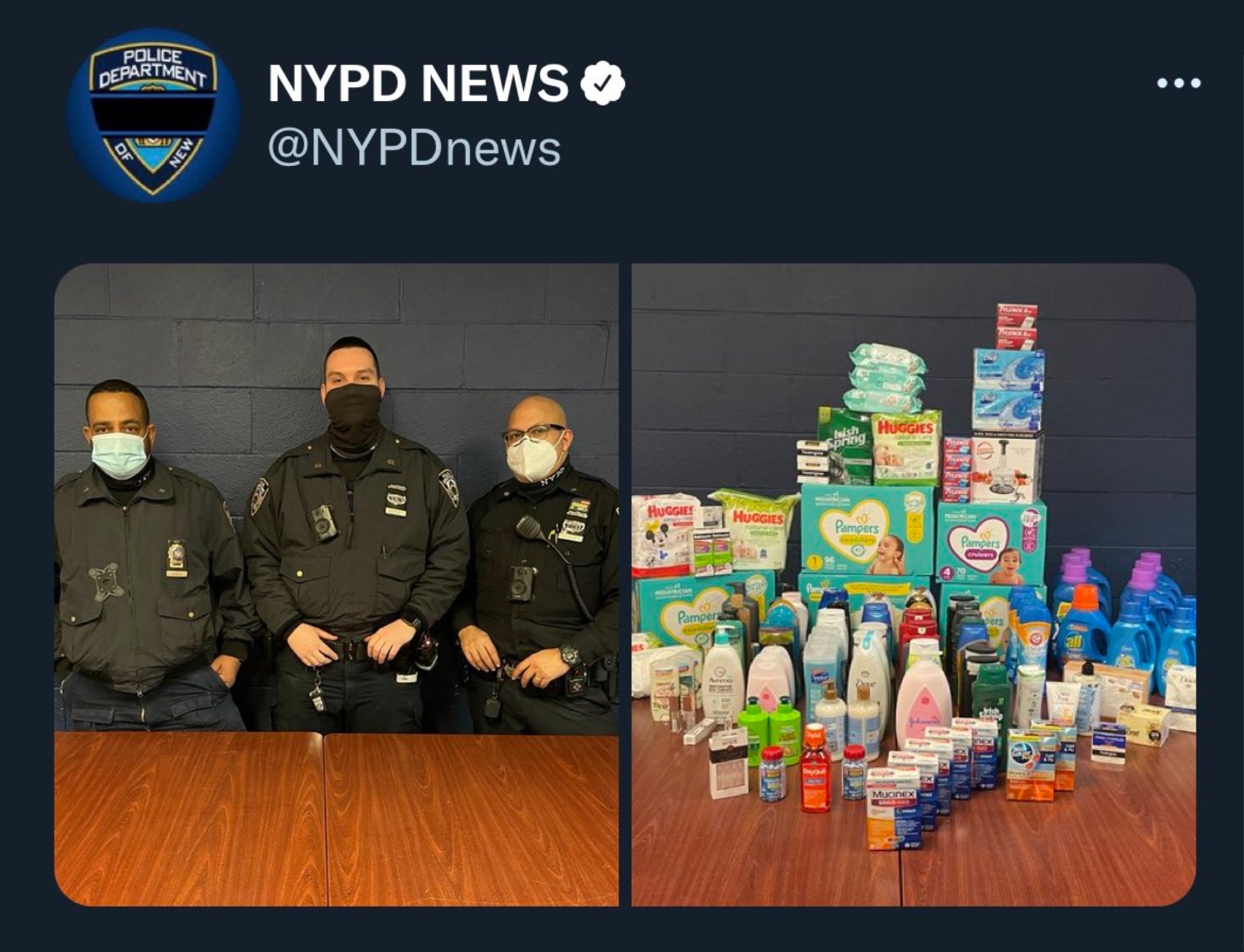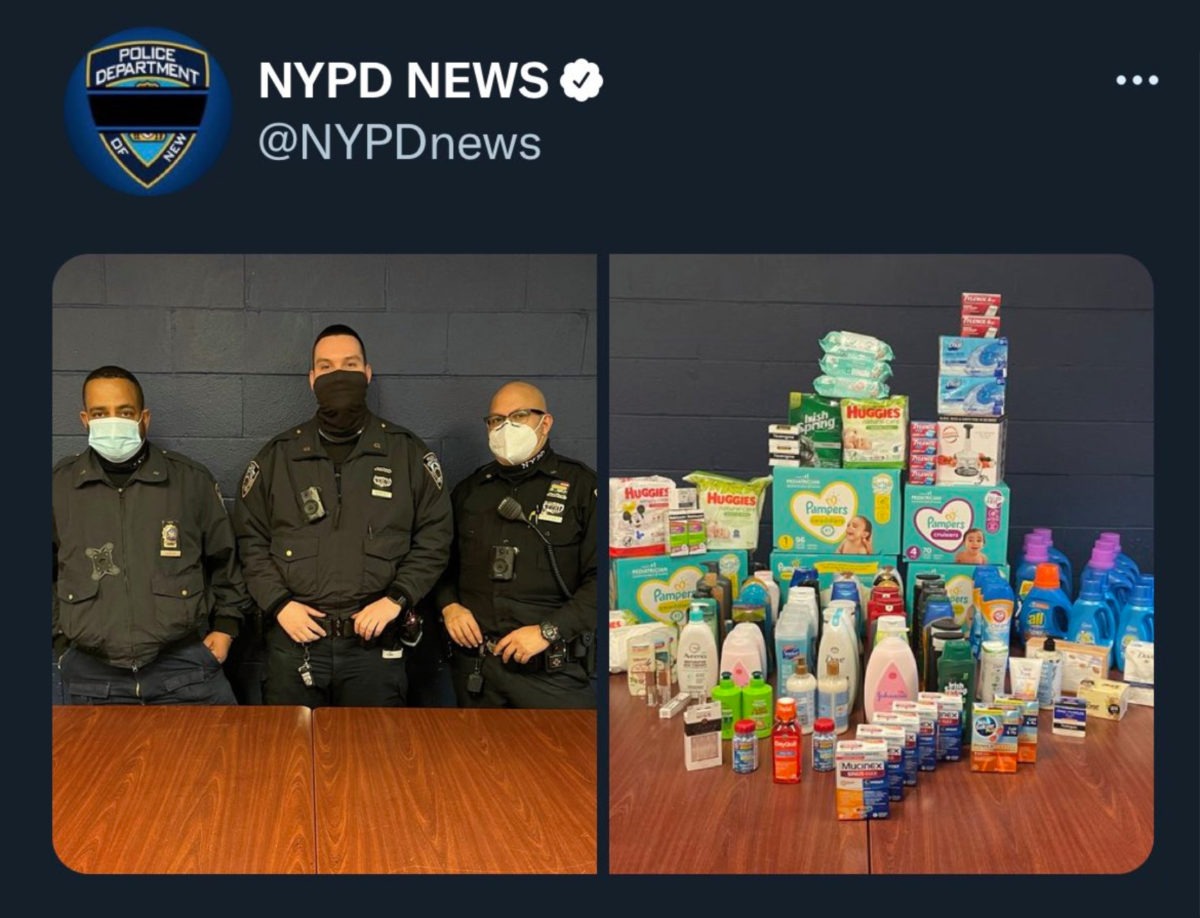Newsletter
Police PR Departments Keep Showing Their Asses
Not literally, thankfully.


Police PR Departments Keep Showing Their Asses
Not literally, thankfully.
by Nick Wing
Police in New York City make hundreds of arrests every day, the overwhelming majority of which we never hear anything about. But every so often, the public relations experts at the NYPD find a case so exemplary of the service their officers provide that they deem it worthy of global recognition.
Like last month, when the PR professionals who run the NYPD’s official Twitter account boasted to more than 700,000 followers that police had arrested 12 people who were allegedly responsible for stealing $1,800 worth of diapers, cold medicine, body wash, and laundry detergent. The tweet included side-by-side photos of three officers and the products laid out on a table as if it were a drug bust.
They can delete it but screenshots are forever. This is what the police do. pic.twitter.com/83PVB9Tvp6
— micah (@micahinATL) February 17, 2022
The backlash was swift, and perhaps entirely predictable to anyone not employed to do PR for the NYPD. The department quickly deleted the tweet, but the dunking was so furious that numerous media outlets wrote stories about their tone-deaf decision to celebrate the criminalization of poverty. Journalist and rapper AWKWORD later noted that one of the arresting officers had attracted dozens of misconduct complaints and cost the city hundreds of thousands of dollars in lawsuit settlements. Even U.S. Rep. Alexandria Ocasio-Cortez, a New York Democrat, criticized the tweet.
After all, the goods in the NYPD’s photo were necessities. Even if the products were meant to be resold, these were likely crimes of survival: People who are otherwise stable don’t make a living hocking stolen diapers to bodegas. Then there’s the question of who was allegedly doing the stealing. As The Appeal’s Elizabeth Weill-Greenberg reported, two of the people arrested, including one 64-year-old woman, appeared to be living at homeless shelters. She was accused of taking about $20 worth of items—a bottle of laundry detergent and a bag of potato chips, according to the criminal complaint obtained by Weill-Greenberg.
Although right-wing tabloids did their best to cover for the NYPD by writing about the arrestees’ “lengthy rap sheets,” those records only suggest that these are people who have been needlessly entangled in the criminal legal system largely because of poverty, instability, and substance use issues.
Upon closer inspection, these arrests were not such a straightforward and obvious victory for public safety. But the fact that the NYPD chose to highlight these particular cases shows just how little police PR departments understand—or care about—the mounting criticisms of their enforcement priorities.
Mobile PD and Mobile’s sheriffs department are more concerned with taking things from homeless people and decorating a tree with “thugshots” pic.twitter.com/57DbBOtluH
— Scorpio Jo 🦂 (@Lesbian_Moses) December 6, 2020
Of course, these are the same officials who’ve helped generate a tidal wave of media coverage about a supposed “shoplifting crisis” in New York City, a storyline that has relied more on concerned statements and cherry-picked anecdotes than concrete data. Maybe it’s not surprising that the people fueling this dubious “crime wave” narrative are now trying to make it look like they’re doing something to combat it.
And if the NYPD can convince the public that officers are protecting them from the most visible kinds of crime, maybe they won’t ask questions about the crimes police care less about, like illegal evictions by landlords.
An investigation by The City, published the same day as the shoplifting tweet, found that the NYPD had made just 39 arrests for illegal evictions in 2020 and 2021—a period in which New York tenants filed 2,642 illegal lockout cases in housing court. The NYPD has made no attempt to digitally perp walk any of the landlords arrested in those cases.
This is far from the first time a police PR department has accidentally called attention to the twisted enforcement priorities that so often define U.S. policing. In 2019, cops in Mobile, Alabama, drew international scorn after they posted a photo on their official Facebook page showing two officers posing with a “homeless quilt” made out of cardboard panhandling signs. In 2018, police in Maine defended their practice of posting the mugshots and other identifying information of people arrested for shoplifting, claiming it was an effective deterrent. The NYPD has also waded into similar controversy before, in 2015, when the city’s largest police union encouraged officers to take photos of unhoused people so they could be put up online for public shaming.
“Please utilize your smartphones to photograph the homeless lying in our streets, aggressive panhandlers, people urinating in public or engaging in open-air drug activity, and quality-of-life offenses of every type,” Ed Mullins, then-President of the Sergeants Benevolent Association, advised officers at the time. Mullins has since resigned from his position, and was slapped last week with federal charges for allegedly defrauding his union out of hundreds of thousands of dollars. There was no official NYPD tweet about this alleged theft either.
As revolting as these sorts of police PR posts can be, they offer a helpful window into the mindset of law enforcement in America. Over the past few years, there has been a growing recognition of the role police play in society, as agents of the state whose primary responsibility is to protect private property and the interests of the rich and powerful, while reinforcing racial and class inequality. When police departments send out tweets gloating about low-level shoplifting arrests, they are simply telling us that this criticism is accurate. They are, in other words, showing their asses—and many people are tired of what they’re seeing.
In the news
Contact us at newsletter@theappeal.org so we can feature your work here.
Maryland lawmakers are poised to pass a bill that would allow many people with felony convictions to serve on juries. Maryland laws are among the nation’s most restrictive when it comes to excluding people with criminal records from jury service, with clauses that cover both felonies and some misdemeanor convictions. Under the legislation, people could serve on juries unless their convictions involved witness intimidation or jury tampering. [Ovetta Wiggins / Washington Post]
Efforts to expand non-police first response services have been complicated by the struggle to accurately identify 911 calls that may pertain to mental health issues. If cities want to expand alternatives to police, 911 operators will have to improve their ability to recognize calls that don’t need a police response, so that they can be patched through to the relevant responders. [David A. Graham / The Atlantic]
A Republican congressional candidate in Florida was caught on police body camera video threatening an officer who’d pulled him over for a traffic infraction. In the footage, Martin Hyde, who is white, suggests the officer’s job could be in peril over the stop—allegedly because Hyde was speeding and texting while driving. Hyde has since admitted to being a “Karen,” apologized, and appears to have abandoned his run for Congress. [Aysha Qamar / Daily Kos]
Voters in Texas are headed to the polls today for primary elections that could have profound consequences on local policies such as bail, the severity of sentences, the death penalty, and prosecutions that target reproductive and voting rights. The newly launched Bolts Magazine has you covered for a breakdown of what’s at stake. [Michael Barajas, Daniel Nichanian / Bolts]
Mark Hale, a former Brooklyn prosecutor who later went on to lead the office’s wrongful-conviction unit, took the stand last week in a hearing to review the integrity of a murder case that landed Anthony Sims in prison for 25 years to life. Although Hale prosecuted the case against Sims, he now says he has no memory of any of the details—including the victim, testifying witnesses, or his own closing argument. [George Joseph / The City]
People leaving prisons in California are currently given a debit card loaded with a maximum of $200. This amount hasn’t changed since 1973, and experts say it’s so insufficient that it can contribute to recidivism. State Senator Sydney Kamlager has introduced legislation that would increase the “gate money” allowance to $2,590. [Maanvi Singh / The Guardian]
That’s all for this week. Feel free to leave us some feedback, and if you want to support our official relaunch, please donate here. Until next time, the work continues.
